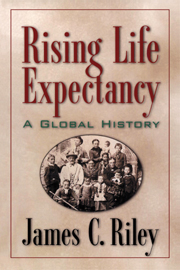Book contents
- Frontmatter
- Dedication
- Contents
- List of Figures, Maps, and Tables
- Preface and Acknowledgments
- Introduction: A Global Revolution in Life Expectancy
- 1 A Brief Overview of the Health Transition
- 2 Public Health
- 3 Medicine
- 4 Wealth, Income, and Economic Development
- 5 Famine, Malnutrition, and Diet
- 6 Households and Individuals
- 7 Literacy and Education
- Conclusion
- Index
4 - Wealth, Income, and Economic Development
Published online by Cambridge University Press: 05 February 2015
- Frontmatter
- Dedication
- Contents
- List of Figures, Maps, and Tables
- Preface and Acknowledgments
- Introduction: A Global Revolution in Life Expectancy
- 1 A Brief Overview of the Health Transition
- 2 Public Health
- 3 Medicine
- 4 Wealth, Income, and Economic Development
- 5 Famine, Malnutrition, and Diet
- 6 Households and Individuals
- 7 Literacy and Education
- Conclusion
- Index
Summary
Income is an unsatisfactory measure of the quality of the human condition. People living in high-income countries certainly enjoy advantages over their counterparts in low-income countries, but the advantages have a particularly uncertain relationship to life expectancy. Jamaica and Belize had 1997 life expectancies of 74.8 and 74.7 years, versus 76.7 in the United States. Yet per capita GDP in Jamaica totaled only $3,440 and in Belize $4,300, compared with $29,010 in the United States. Neither countries nor individuals have sought to gain higher incomes as a way to improve their survival prospects. Nor will anyone confuse generous wealth or income with longevity. The relationship is mediated.
Recent research suggests that there may be three routes of mediation. On the first route income is an enabling tool, the compensation from which varies according to the choices made by individuals and public institutions. At the individual level higher income may lead to more command over important proximate factors of survival, such as food and health care. And at the level of a society higher average income may lead to a better provision of services important to survival, such as clean water, immunizations, sanitary facilities, education, and health institutions such as hospitals. On the second route, higher average income may make it easier to reduce poverty and thereby diminish the share of the population whose prospects of escaping premature death are especially fragile.
- Type
- Chapter
- Information
- Rising Life ExpectancyA Global History, pp. 122 - 144Publisher: Cambridge University PressPrint publication year: 2001
- 1
- Cited by



